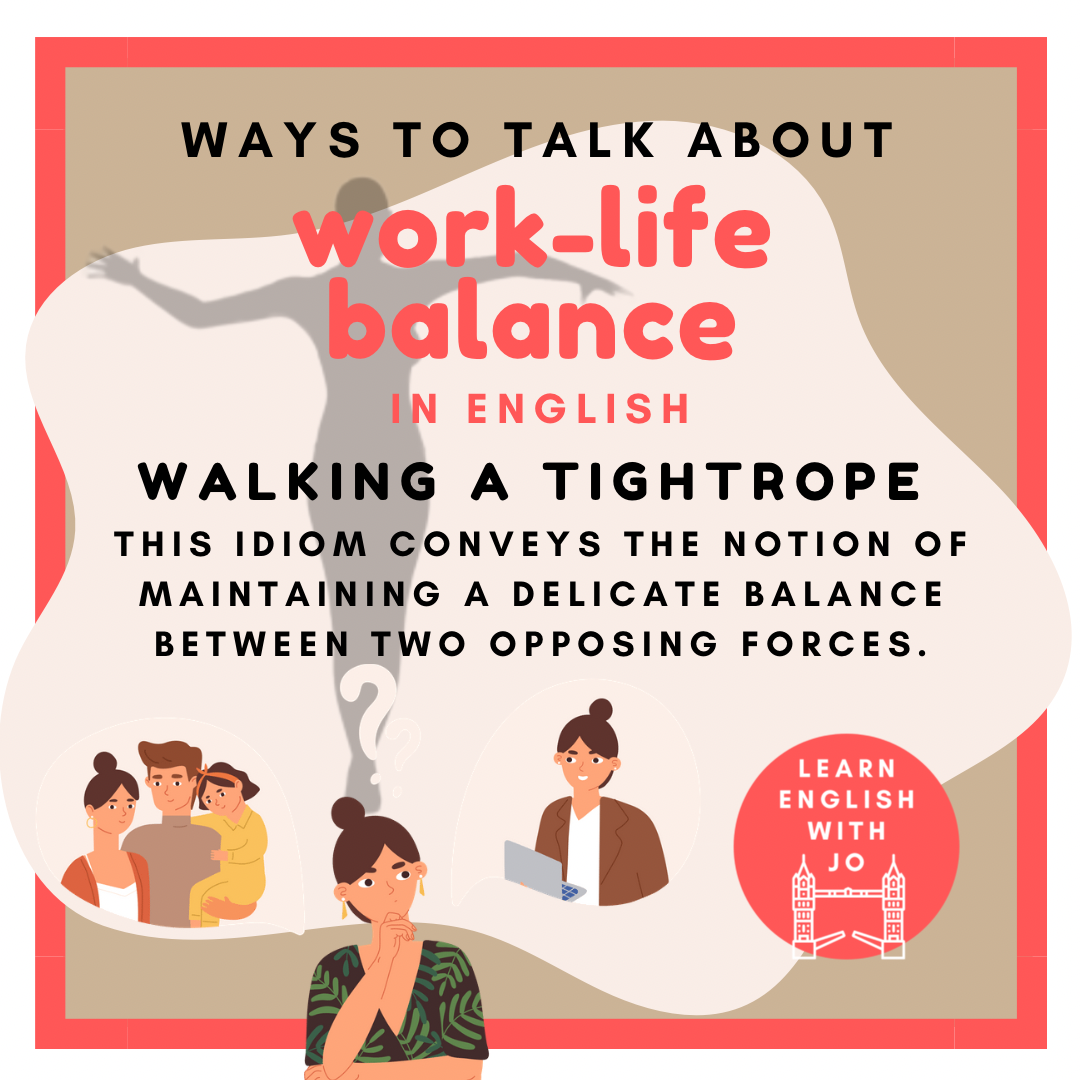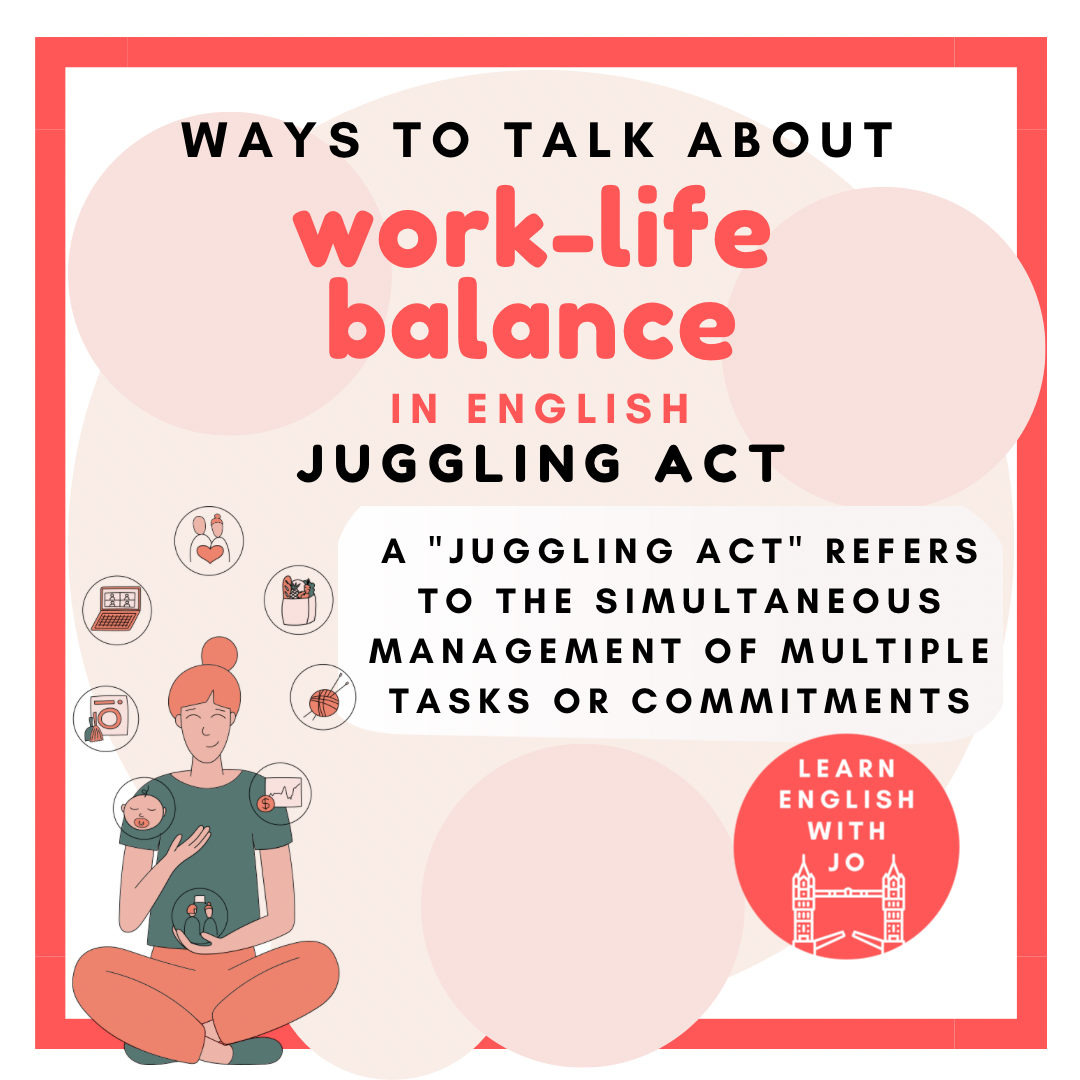Ways to talk about work-life balance in English
Work-life balance refers to the equilibrium an individual strives to achieve between their professional commitments and personal well-being. It involves effectively managing one's time, energy, and focus to fulfil the demands of a career while also nurturing meaningful relationships, pursuing personal interests (such as working on your English!) and maintaining physical and mental health. Striking a healthy work-life balance is essential to prevent burnout, reduce stress, and cultivate a fulfilling and good life.
It sounds simple right? But we all know that in reality it is rather more difficult. This is a subject my students and I often talk about in their conversation classes and while we may not have come up with a magic answer for achieving the ever elusive work-life balance, we have come up with some good ways to talk about the topic in English.
If you’d like to talk about work-life balance in a one-to-one English conversation class then book a session with me through my profile on italki or drop me a message.
The following expressions, idioms and vocabulary will equip you with some of the language that you could use whilst discussing this topic.
Walking a Tightrope
Imagine stepping on a thin rope, high above the ground, where even a slight waver could lead to a tumble. "Walking a tightrope" paints the picture of delicately maintaining equilibrium between work and personal life. It captures the notion of treading carefully to avoid leaning too heavily in one direction.
Example: Chris, who's studying and working part-time, often feels like he's walking a tightrope, trying to excel academically while maintaining his social life.
A Juggling Act
"A juggling act" vividly describes the art of managing diverse responsibilities or tasks, symbolizing the challenge of simultaneously handling work and personal commitments.
Example: Tina's life resembles a juggling act as she balances her job, family commitments, and pursuing her passion for photography.
Hybrid Working
In the modern digital age, "hybrid working" has taken center stage. It refers to a work arrangement that blends remote work with in-person office attendance. This approach acknowledges the importance of flexibility in attaining work-life harmony.
Example: The company's innovative hybrid working policy lets employees work from home several days a week, promoting a healthier work-life balance.
Find/Strike a Balance
To "find" or "strike a balance" is to attain a good blend between professional and personal life. This expression emphasizes the idea that equilibrium is achievable with conscious effort.
Example: James is determined to strike a balance between his job, personal projects, and spending quality time with his family.
Have Your Plate Full
"Having your plate full" signifies being extremely busy or having numerous responsibilities to manage, often reaching a point where taking on more becomes overwhelming.
Example: Despite managing his coursework, a part-time job, and volunteering, Alex still finds time to learn a new instrument—his plate is definitely full!
Burning the Candle at Both Ends
This expression paints a vivid image of a candle being burned from both ends, symbolizing the overexertion resulting from working excessively and neglecting rest or personal life.
Example: Mina's been burning the candle at both ends, working late nights and weekends, but now she's determined to prioritize self-care.
Work-Life Integration
Unlike balance, "work-life integration" suggests merging work and personal life seamlessly. It emphasizes creating a synergistic relationship between the two rather than trying to keep them strictly separate.
Example: By working on her creative projects during her downtime, Sarah has found a way to achieve work-life integration that suits her.
Time Chunking
This technique involves dividing your day into chunks of time dedicated to specific tasks. By doing so, you can efficiently allocate time to work, relaxation, and personal activities.
Example: Using time chunking, Michael manages his work tasks, exercises, and leisure activities, ensuring a well-structured day.
More Work-Life Balance Vocabulary:
Flexibility: The ability to adjust working hours or arrangements to accommodate personal needs.
Time Management: Efficiently organizing and allocating time for work and personal activities.
Burnout: A state of emotional, mental, and physical exhaustion due to excessive work stress.
Overwork: Working too many hours, often leading to burnout.
Quality Time: Meaningful and focused time spent with family, friends, or on personal hobbies.
To prioritize: To rank tasks or activities based on their importance and urgency.
Boundary: A clear separation between work-related activities and personal time.
To unplug: To disconnect from work-related communication or technology during personal time.
Stress Management: Techniques and strategies to cope with and reduce stress.
Workaholic: A person who is excessively dedicated to work and neglects other aspects of life.
Time Off: Paid or unpaid leave from work for relaxation, vacation, or personal reasons.
Sabbatical: An extended period of leave from work, often for rest, study, or travel.
Personal Well-being: The overall state of physical, mental, and emotional health.
Productivity: The level of output or efficiency in completing tasks.
Mental Health Days: Days off taken to focus on one's emotional and psychological well-being.
Want to book a conversation class with me? Sign up to italki and you will receive $10 italki credits in your student wallet within 48 hours of making you first purchase



